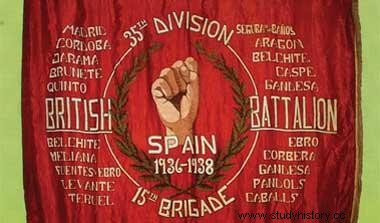
What ideas 7 What men? Five years apart, elections
shook political Spain upside down and changed its destiny.
On April 12, 1931, the municipal elections , intervened in a pre-revolutionary climate, give a curious result:if, indeed, the number of the monarchist councilors largely outweighs that of the republican councillors, their distribution in the whole of the country expresses a republican victory. Believing that he had lost the trust and love of his people, Alfonso XIII, without renouncing his rights, abandoned the throne. He leaves Spain. On April 15, the Spanish Republic is proclaimed.
Courageously, the government team — Niceto Alcala Zamora, Head of State and President of the Council, surrounded by Alejandro Lerroux (Garcia, Miguel Maura, Manuel Azana Diaz, Indalecio Prieto Tuero and Francisco Largo Caballero — got to work. Among of the many problems it has to solve, there are three that seem to it to have priority:agrarian reform, autonomist and religious issues.
On the first point, agreement is difficult to reach between Republicans, depending on whether they are Communists, Socialists or Liberals. Land expropriation has
disappointing effects.
The state has become the boss, which is not much better for the farmers. Agricultural wages are rising, leading to unemployment.
The cost of living is rising. Strikes are on the rise. Peasants and workers are dissatisfied and turn to the extreme left. On the other hand, autonomy granted to Catalonia tempts the Basque country and Navarre. Separatism risks fragmenting republican unity.
Finally. anticlericalism. asserted too slowly by the government in its clumsy measures. frightens and outrages the moderate elements of the population. Incer
few of its support in the center, the Azafia cabinet, which succeeded that of Alcalâ Zamora, bends its policy towards the left, itself overtaken by the extreme left, embodied by the General Confederation of Labour.
Un pronunciamiento; led by General José Sanjurjo Sacanell and quickly brought under control, opens an era of ministerial instability, followed by an unexpected event:the triumph, in the legislative elections, of the right, represented by a party - the Spanish Confederation of Autonomous Rights, or C.E.D.A. — and by a man — José Maria Gil Robles. Although offering a fairly advanced social program, the C.E.D.A. is powerless to stem the rising tide from the left. This triumphed in the legislative elections of February 1936, under the red banner of the Frente popular.
